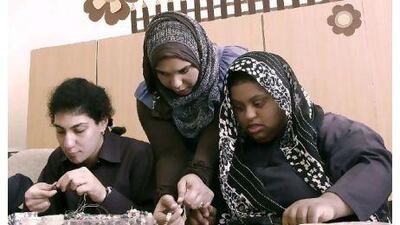SHARJAH // Ways to help the estimated three million people around the world who are on the brink of starvation took centre stage at Sharjah Women's College yesterday.
Organised as part of the Higher Colleges of Technology's fourth Festival of Thinkers biennial, the panel discussion on famine and poverty was led by five social activists.
"Population is a huge issue and inevitably it is a resource issue," said Sean Evers, the panel's mediator and managing partner of Gulf Intelligence, a Dubai-based communications company. "If you have seven billion people who need to be fed and need water every day, it's a substantial task."
There are twice as many people sharing the world's resources as there were in the 1960s, according to the UN Population Fund. And that number is expected to reach over 9 billion in the next 40 years.
"Historically, one of the solutions to hunger and poverty was to move," said Amy Stokes, one of the panellists and founder of Infinite Family, a company that mentors teenagers in difficult circumstances in Africa. But with the number of people increasing, moving was no longer an option, she said.
Also on the panel were: Michael Brosowski, who teaches English to street children in Hanoi through the Blue Dragon Children's Foundation; Paul Kronenberg, who founded Braille Without Borders for blind children in Tibet; Diane Latiker, who created Kids Off The Block for children on the streets of Chicago; and Rebecca Stromeyer, who established e-Learning for children in Kenya.
Each of the panelists had a suggestion to help those across the world who are starving.
"One of the reasons the crisis is repeating itself is because NGOs compete against each other," said Mr Brosowski. "It means we're not working towards the same dream."
Ms Stokes said women played a key part through their role in the family.
"The more educated women are, the fewer children they have," added Mr Evers. "It's not about population control, it's about education."
He said in places where women enjoyed equal status with men, were educated and played an active role in society, population levels were significantly lower.
While this wasn't always the case in the Middle East, Mr Evers said the UAE fell into a different category. "The leadership of this country constantly repeated - in the last decade and increasingly in the last five years - that women have a very active role to play here," he said. "They hold positions of power in terms of business and government so it's definitely more present here."
Other problems facing food security include logistics and infrastructure. Although 60 per cent of the world's arable land is found in Africa, "moving food from where it is to where it is needed is one of the biggest challenges," said Mr Evers.
Food imports pose another threat to food security, the panel said. They gave the example of China, which needs to import food to feed its population of 1.4 billion, many of whom live in cities.
"In the last five to eight years, China bought large swathes of agricultural land in South America," said Ms Stokes.
"The country now imports five per cent of its food requirements but it's a controversial way of securing food and a flawed strategy to a certain extent," added Mr Evers.
He said if a global food crisis hit, China would still be importing food from places such as Uganda or South America which were already struggling to feed themselves. "It's a flawed policy, but many countries are doing it."
Mr Evers said the UAE's strategy was safer because it invested in food production. "You become a shareholder in a company that produces food, that way you're both winning in the equation."
The Festival of Thinkers, which concluded yesterday, saw thousands of students and staff meet for discussions and workshops with participants from around the world. More than 350 international graduate students from 83 universities were invited to join their Emirati peers at the seven sessions that took place on seven campuses across the UAE.
The three-day conference tackled nine themes, including the global economic crisis, education, health, the arts and leadership.

